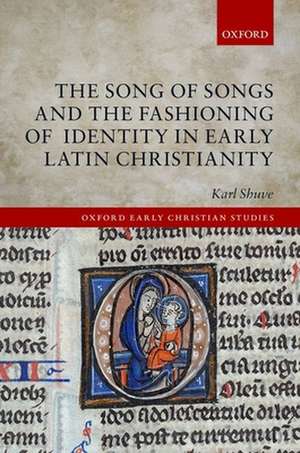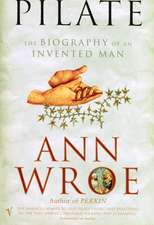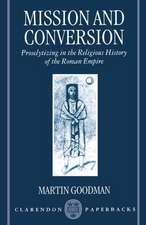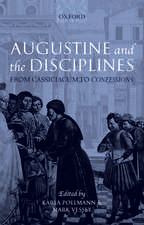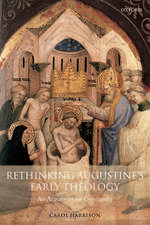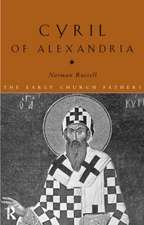The Song of Songs and the Fashioning of Identity in Early Latin Christianity: Oxford Early Christian Studies
Autor Karl Shuveen Limba Engleză Hardback – 24 mar 2016
Din seria Oxford Early Christian Studies
- 30%
 Preț: 500.48 lei
Preț: 500.48 lei - 12%
 Preț: 252.05 lei
Preț: 252.05 lei - 17%
 Preț: 582.40 lei
Preț: 582.40 lei - 19%
 Preț: 497.45 lei
Preț: 497.45 lei - 30%
 Preț: 582.12 lei
Preț: 582.12 lei - 28%
 Preț: 472.87 lei
Preț: 472.87 lei - 30%
 Preț: 528.78 lei
Preț: 528.78 lei - 30%
 Preț: 491.67 lei
Preț: 491.67 lei - 25%
 Preț: 627.62 lei
Preț: 627.62 lei - 17%
 Preț: 581.27 lei
Preț: 581.27 lei - 28%
 Preț: 437.84 lei
Preț: 437.84 lei - 27%
 Preț: 573.73 lei
Preț: 573.73 lei - 12%
 Preț: 616.72 lei
Preț: 616.72 lei - 20%
 Preț: 705.73 lei
Preț: 705.73 lei - 25%
 Preț: 568.80 lei
Preț: 568.80 lei - 30%
 Preț: 504.56 lei
Preț: 504.56 lei - 30%
 Preț: 542.84 lei
Preț: 542.84 lei - 26%
 Preț: 517.83 lei
Preț: 517.83 lei - 26%
 Preț: 598.30 lei
Preț: 598.30 lei - 30%
 Preț: 820.42 lei
Preț: 820.42 lei - 34%
 Preț: 1036.50 lei
Preț: 1036.50 lei - 30%
 Preț: 1107.11 lei
Preț: 1107.11 lei - 22%
 Preț: 361.61 lei
Preț: 361.61 lei - 34%
 Preț: 1326.79 lei
Preț: 1326.79 lei - 9%
 Preț: 255.03 lei
Preț: 255.03 lei - 34%
 Preț: 1123.50 lei
Preț: 1123.50 lei - 34%
 Preț: 845.94 lei
Preț: 845.94 lei - 14%
 Preț: 449.09 lei
Preț: 449.09 lei - 34%
 Preț: 1195.96 lei
Preț: 1195.96 lei - 22%
 Preț: 391.92 lei
Preț: 391.92 lei - 34%
 Preț: 1033.77 lei
Preț: 1033.77 lei - 34%
 Preț: 1255.59 lei
Preț: 1255.59 lei - 34%
 Preț: 819.81 lei
Preț: 819.81 lei - 19%
 Preț: 293.17 lei
Preț: 293.17 lei - 34%
 Preț: 1725.86 lei
Preț: 1725.86 lei - 34%
 Preț: 1761.02 lei
Preț: 1761.02 lei - 30%
 Preț: 947.60 lei
Preț: 947.60 lei - 34%
 Preț: 888.89 lei
Preț: 888.89 lei - 30%
 Preț: 1006.79 lei
Preț: 1006.79 lei - 30%
 Preț: 835.47 lei
Preț: 835.47 lei - 30%
 Preț: 1415.68 lei
Preț: 1415.68 lei - 34%
 Preț: 1199.53 lei
Preț: 1199.53 lei - 34%
 Preț: 756.65 lei
Preț: 756.65 lei - 34%
 Preț: 1107.76 lei
Preț: 1107.76 lei - 34%
 Preț: 873.24 lei
Preț: 873.24 lei - 34%
 Preț: 1446.26 lei
Preț: 1446.26 lei - 28%
 Preț: 338.52 lei
Preț: 338.52 lei - 34%
 Preț: 2061.53 lei
Preț: 2061.53 lei - 34%
 Preț: 1036.54 lei
Preț: 1036.54 lei
Preț: 641.95 lei
Preț vechi: 922.02 lei
-30% Nou
Puncte Express: 963
Preț estimativ în valută:
122.85€ • 126.91$ • 102.24£
122.85€ • 126.91$ • 102.24£
Carte tipărită la comandă
Livrare economică 15-21 martie
Preluare comenzi: 021 569.72.76
Specificații
ISBN-13: 9780198766445
ISBN-10: 0198766440
Pagini: 258
Dimensiuni: 162 x 241 x 21 mm
Greutate: 0.5 kg
Editura: OUP OXFORD
Colecția OUP Oxford
Seria Oxford Early Christian Studies
Locul publicării:Oxford, United Kingdom
ISBN-10: 0198766440
Pagini: 258
Dimensiuni: 162 x 241 x 21 mm
Greutate: 0.5 kg
Editura: OUP OXFORD
Colecția OUP Oxford
Seria Oxford Early Christian Studies
Locul publicării:Oxford, United Kingdom
Recenzii
Shuve's fine study - detailed, scholarly and smoothly-written - opens new vistas on the multifarious uses to which the Song of Songs could be put in late ancient Latin Christianity.
Karl Shuve has shown that the more common, one could even say standard, approach to Latin Christian exegesis of the Song of Songs has missed some of the most important moments of influence of this beautiful text in the shaping of the western Christian tradition... This book is elegantly presented and wholly credible.
The author of this rich and finely written study makes the very important point that the early interpreters were not very troubled by a bad conscience about not acknowledging the plain sense as a human, sexually erotic one, as readers like Elizabeth Clark have seemed to suppose.
Most accounts of the history of exegesis of the Song of Songs in Western Christianity focus on the commentary tradition, assume that the book's erotic character was a problem to be overcome by imaginative allegorical reading, highlight the theme of the soul's mystical ascent to the divine, and acknowledge the great third-century Alexandrian theologian Origen as the dominant influence on the development of both patristic and medieval interpretations of the Song. In his thorough and often insightful revisionist history of the Song's role in third- and fourth-century Latin debates about ecclesiology and ascetical theology, Karl Shuve successfully challenges previous scholarship on all of those points. As a result, the history of Song exegesis in the patristic West will need to be thoroughly rewritten, and the subsequent history of medieval interpretation will at least need to be inflected with some appropriate nuance.
Karl Shuve has shown that the more common, one could even say standard, approach to Latin Christian exegesis of the Song of Songs has missed some of the most important moments of influence of this beautiful text in the shaping of the western Christian tradition... This book is elegantly presented and wholly credible.
The author of this rich and finely written study makes the very important point that the early interpreters were not very troubled by a bad conscience about not acknowledging the plain sense as a human, sexually erotic one, as readers like Elizabeth Clark have seemed to suppose.
Most accounts of the history of exegesis of the Song of Songs in Western Christianity focus on the commentary tradition, assume that the book's erotic character was a problem to be overcome by imaginative allegorical reading, highlight the theme of the soul's mystical ascent to the divine, and acknowledge the great third-century Alexandrian theologian Origen as the dominant influence on the development of both patristic and medieval interpretations of the Song. In his thorough and often insightful revisionist history of the Song's role in third- and fourth-century Latin debates about ecclesiology and ascetical theology, Karl Shuve successfully challenges previous scholarship on all of those points. As a result, the history of Song exegesis in the patristic West will need to be thoroughly rewritten, and the subsequent history of medieval interpretation will at least need to be inflected with some appropriate nuance.
Notă biografică
Karl Shuve is Assistant Professor of Religious Studies at the University of Virginia.
